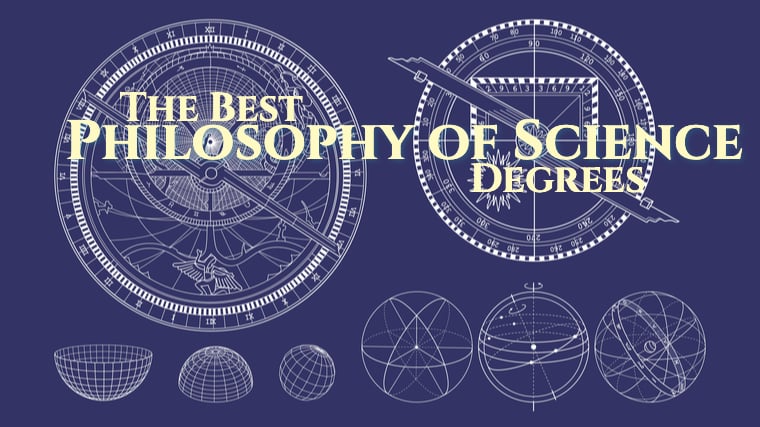| Rank | School | Location |
|---|---|---|
| 1 | Stanford University | Stanford, California |
| 2 | University of Notre Dame | Notre Dame, Indiana |
| 3 | University of Pittsburgh-Pittsburgh Campus | Pittsburgh, Pennsylvania |
| 4 | University of Pennsylvania | Philadelphia, Pennsylvania |
| 5 | University of Illinois at Chicago | Chicago, Illinois |
| 6 | Boston University | Boston, Massachusetts |
| 7 | University of California-Irvine | Irvine, California |
| 8 | Arizona State University-Tempe | Tempe, Arizona |
| 9 | California Institute of Technology | Pasadena, California |
| 10 | University of Washington-Seattle Campus | Seattle, Washington |
| 11 | Case Western Reserve University | Cleveland, Ohio |
| 12 | University of Utah | Salt Lake City, Utah |
This is a ranking of the best Philosophy of Science degree programs in the US.
This ranking is designed for students to make informed college and degree decisions for getting an undergraduate or graduate degree in the Philosophy of Science.
Philosophy of Science programs are often History and Philosophy of Science programs, which give students an historical and philosophical education concerning science.
These programs are taken within Philosophy departments, but are often taught in collaboration with History, Science, Mathematics, and other departments, making Philosophy of Science a highly interdisciplinary course of study.
This ranking includes universities that offer bachelor's, master's and PhD programs in the Philosophy of Science (including the History and Philosophy of Science programs).
In many of these programs students may emphasize a certain science in their degree.
What is Philosophy of Science?
A very informative discussion from philosopher of science Hilary Putnam. Philosophy of Science is the academic study of the philosophical presuppositions that science is based on and employs in its various methodologies.
Why study the History and Philosophy of Science? Knowing the history of science puts the philosophy that went into the formation of science into proper context, and illuminates what its' founders and pioneers believed.
In tandem with the historical aspect of science is the importance of philosophical understanding of science, such as how its methodologies are constructed, its foundational assumptions, and where science is headed into the future.

The Best Philosophy of Science Degree Programs
Ranking Methodology
These programs were considered using their respective academic influence. For an explanation of academic influence and our overall ranking methodology, please see our College Denominator. We also factored into the ranking what degrees are offered (such as undergraduate and/or graduate), the department(s) involved, the variety of coursework, and academic prestige.
Stanford University
Stanford, California
Stanford offers the Bachelor of Arts in Philosophy: History and Philosophy of Science degree and the Doctor of Philosophy in Philosophy: History and Philosophy of Science degree.
Courses in the Bachelor of Arts in Philosophy: History and Philosophy of Science program include:
- Introduction to Philosophy of Science
- Greek Philosophy
- Mathematical Logic
- Philosophy and the Scientific Revolution
Advisors are assigned to students to help direct the course of study. This program is taken in collaboration with the History department. Students will take history of science and philosophy of science courses. This BA in Philosophy program requires a capstone project by completing a Capstone Seminar. An Honors Program is also available to students.
Stanford also offers a Doctor of Philosophy in Philosophy: History and Philosophy of Science.
Courses include:
- Philosophy of Physics: Space and Time
- Significant Figures in Philosophy of Science: Einstein
- Philosophy of Biology
University of Notre Dame
Notre Dame, Indiana
University of Notre Dame offers the PhD program in History and Philosophy of Science, which can be completed in five years. Notre Dame admits four students per year into this program.
Students choose one (of three) tracks: History, Philosophy, or Theology, and learn the history and philosophy of Science within their chosen track. This program involves the interdisciplinary involvement of the following departments and programs:
Departments:
- Department of Philosophy
- Department of History
- Department of Mathematics
- Department of Physics
Programs:
- Program of Liberal Studies
- Program in Gender Studies
- Joint Philosophy-Mathematics Ph.D. Program
- GLOBES Program in Environment and Society
Students are trained in the History and Philosophy of Science and in their chosen track in particular. The first three years are spent working on coursework, and the second two years are spent in dissertation work.
Notre Dame also offers a concurrent Master's degree in the History and Philosophy of Science for students who are already enrolled in a different PhD program.
University of Pittsburgh-Pittsburgh Campus
Department of History and Philosophy of Science
Pittsburgh, Pennsylvania
The Department of History and Philosophy of Science works closely with the Center for Philosophy of Science at the University of Pittsburgh. The Department offers undergraduate and graduate degrees in the Philosophy of Science. Students can pursue a bachelor's, master's, and PhD in the History and Philosophy of Science.
Undergrads who major in HPS are required to complete 15 credit hours in a science. In light of this requirement, a double-major (in one of the sciences and the HPS) is a compelling option. A logic requirement and four electives must be taken. 37 credit hours are required in total.
History of Science courses include:
- Myth and Science
- Space, Time, Matter
- Magic, Medicine and Science
Students will also take the Intro to Philosophy of Science course. The 15 credit hours in a social or natural science means that the student will receive an advanced level of study in one of the sciences.
The History and Philosophy of Science graduate program is interdisciplinary, and students learn the conceptual and historical foundations of science by taking courses and seminars that can lead to a Master of Arts and PhD degree.
The PhD and Master of Arts degrees are available, however, applications from students not currently enrolled at the University are only accepted into the PhD program.
The terminal Master of Arts degree may be pursued by students who are already enrolled in other graduate programs at the University.
Department faculty research topics include:
- Philosophy of Space and Time
- Historical interaction of Philosophy & Science after the Renaissance
- Medieval and Greek Science
- Einstein's Theory of Relativity
- Explanation in the Special Sciences
- Galileo
- Logic of Scientific Inference
- History and Philosophy of Molecular Biology
- Causation
- History and Philosophy of Evolutionary Biology
- Philosophy of Psychology, Cognitive science, and Neuroscience
- Philosophy of Medicine
- 17th-century Mechanical Philosophy
- Scientific Change and Progress
University of Pennsylvania
Philadelphia, Pennsylvania
University of Pennsylvania offers the Ph.D. in Philosophy of Science program. Degree requirements include:
- History of philosophy: three courses
- Value theory (such as moral theory): 2 courses
- Contemporary metaphysics and analytic epistemology: 2 courses
This program teaches students the interrelated nature of the history of science and the history of philosophy. Students also learn the history of the philosophy of science. 15 courses are required, and three may be taken outside of Philosophy (such as Science or History courses) with approval.
University of Illinois at Chicago
College of Liberal Arts and Sciences, Department of Philosophy
Chicago, Illinois
University of Illinois at Chicago offers a PhD with a concentration in the Philosophy of Science. This program takes five years to complete. There are two phases to the PhD program: stage one consists of graduate seminars and takes three years, and the second stage consists of work on the doctoral dissertation and takes two years.
Students will take a History of Philosophy course in either ancient or medieval, and one in modern philosophy, and a class in Logic.
Students also take five classes, with at least one class in all three of these areas:
- epistemology or metaphysics
- social and political philosophy, ethics, philosophy of law, or aesthetics
- philosophy of logic, philosophy of science, or philosophy of language
In their third year, students are given a project that prepares students for working on their dissertation. The dissertation is defended in an oral exam.
Boston University
Department of Philosophy
Boston, Massachusetts
Boston University offers the Master of Arts in Philosophy, with a concentration in the Philosophy of Science. This program is a terminal degree, available to students who are full or part-time, taken through the Department of Philosophy.
The Department of Philosophy is closely associated with the Center for Philosophy & History of Science, and the Institute for Philosophy & Religion (both at Boston University).
Students learn the conceptual foundations of sciences, including:
- Medicine
- Psychology
- Natural Sciences (earth sciences, chemistry, physics, and biology)
- Mathematics
- Social Sciences
- Cognitive Sciences
- Economics
Students also learn about the history of science, and the intersection of science and religion.
Students who are applying should have the equivalent of an undergraduate degree with a major in philosophy, with a minimum of a B average G.P.A. Undergraduates are also encouraged to apply who have a minor in philosophy.
University of California-Irvine
School of Social Sciences, Department of Logic and Philosophy of Science
Irvine, California
U.C. Irvine offers the Ph.D. in Logic & Philosophy of Science doctoral program through their Department of Logic and Philosophy of Science.
Students in the PhD program are guaranteed six years of funding. Students in the Department of Logic and Philosophy of Science may also earn research funding and fellowships from the National Sciences Foundation, and the National Endowment for the Humanities.
Campus fellowships are also available:
- Newkirk Graduate Student
- Graduate LEAD
- Provost Ph.D.
- Eugene Cota-Robles
- Graduate Dean’s Dissertation
U.C. Irvine also offers an interdisciplinary minor in History and Philosophy of Science.
A Bachelor's Degree in Physics: Concentration in Philosophy of Physics is also offered, taken through the Department of Physics. This concentration is for students to learn a thorough understanding of physical theories in physics.
Arizona State University-Tempe
Tempe, Arizona
Arizona State University offers a History and Philosophy of Science PhD program. Students learn the epistemology, history, and conceptual nature of science and how they all effect society.
The program is taught by 23 professors, and is made up on 35 students. The PhD in the History and Philosophy of Science is an 84 hour program that takes 5 years to complete. For students who already have a master's degree, 30 credits may apply towards the 84 hour total requirement.
Through the ASU-MBL History of Biology Seminar, students have access to the Marine Biological Laboratory in Woods Hole, Massachusetts. Participation in the Digital Innovation Group allows students to use big data for History and Philosophy of Science questions.
Selection of courses:
- History of Biology
- History of Science
- Philosophy of Science
- Biology and Society Lab
- Carnap and Quine
- Environmental Ethics and Policy Goals
Five years of funding as a research or teaching assistant is guaranteed.
California Institute of Technology
Division of the Humanities and Social Sciences
Pasadena, California
Cal Tech offers the Bachelor of Science in History and the Philosophy of Science degree. This program teaches undergrad students how science has been practiced over its history.
The History and Philosophy of Science courses teach students the following competencies:
- Philosophical issues in scientific fields (physics, biology, medicine, neuroscience, mathematics)
- Explanation and Causation
- Foundations of Probability and Statistical Inference
Essay writing and making historical and philosophical arguments are emphasized. Because of this emphasis, students are taught communication and writing skills, preparing them for further study in a graduate program in the history and philosophy of science, as well as other disciplines such as law, science and journalism.
University of Washington-Seattle Campus
Department of Philosophy
Seattle, Washington
The University of Washington offers undergrad students the Bachelor of Arts: History of Philosophy and Science degree. This program studies the institutions of science, its theories, practices, and methods, within philosophical and historical disciplines.
Degree requirements:
- Core courses (25 credits)
- Electives (25 credits)
- Science coursework (30 credits)
- HPS Capstone
The Core courses include:
- Philosophy of Science
- Science in Civilization: Antiquity to 1600
- Colloquium in History and Science
- Science in Civilization: Science in Modern Society
Students must maintain a minimum GPA of 2.50 when taking the 30 credits of Natural World courses, which include:
- Atmospheric Sciences
- Mathematics
- Sociology
- Computer Science
- Economics
The University also offers an Honors track for students who maintain a GPA over 3.30 for all of the HSP courses and meet other requirements.
Case Western Reserve University
College of Arts and Sciences, The Department of History and the Department of Philosophy
Cleveland, Ohio
Case Western Reserve University offers an undergraduate degree in the History and Philosophy of Science. This program is a collaboration between the Department of History and the Department of Philosophy. Students learn about the development of science through historical and philosophical methodologies.
This program allows students to focus on an emphasis in the following subjects:
- Philosophy of Science
- History of the Medical and Biological Sciences
- History of the Physical Sciences
The program requires 30 credit hours.
Courses include:
- Technology in European Civilization
- Revolutions in Science
- Science in Western Thought I & II
- Modern Philosophy
Case Western also offers a Minor in the History and Philosophy of Science, which has a requirement of 15 hours.
University of Utah
Philosophy Department
Salt Lake City, Utah
University of Utah offers a Bachelor of Science/Bachelor of Arts in the Philosophy of Science. Students are taught ethical, logical, and analytic reasoning concerning:
- Scientific Reasoning
- Nature of Science
- Social and Moral Implications of Scientific and its Practice
- Ability to Apply Knowledge to Social Sciences and other specific Sciences
Courses include:
- Communicating Science, Health, Environment
- History of African American Philosophy
- Environmental Ethics
- Advanced Inductive Logic
A minimum of a 122 credit hours are required, with 33 of them being in the major.
University of Utah offers a Bachelor of Science/Bachelor of Arts in the Philosophy of Science. Students are taught ethical, logical, and analytic reasoning concerning:
- Scientific Reasoning
- Nature of Science
- Social and Moral Implications of Scientific and its Practice
- Ability to Apply Knowledge to Social Sciences and other specific Sciences
Courses include:
- Communicating Science, Health, Environment
- History of African American Philosophy
- Environmental Ethics
- Advanced Inductive Logic
A minimum of a 122 credit hours are required, with 33 of them being in the major.
Frequently Asked Questions
What is meant by the Philosophy of Science?
Philosophy of Science is the study of the philosophical presuppositions that are involved in the sciences, such as the assumptions made, how the scientific method is formulated, and the implications of the sciences.
For example, different sciences employ different methodologies. Determining the appropriate methodologies is informed by the philosophy of science. The Philosophy of Science is concerned with understanding the philosophical presuppositions that undergird and inform science and the scientific method. Philosophical disciplines such as logic, mathematics, epistemology, ontology, and metaphysics are all brought to bear on science and the nature of truth.
Why is Philosophy of Science important?
Philosophy of Science is important because science employs philosophical interpretations in its findings and is made up of philosophical presuppositions in its foundations and methodologies. The Philosophy of Science can help explain that science is a human endeavor not unlike other human endeavors. The validity of logic and inference, for example, have to be presupposed before conducting science.
What is Philosophy of Science in research?
The Philosophy of Science in research is the set of philosophical presuppositions that are involved in determining the end goal of the research, and how best to attain it; through what methodology, and how to gather and interpret the appropriate data sets necessary for the research.
What is a History and Philosophy of Science degree?
A History and Philosophy of Science degree can be a bachelor's, master's, or doctorate degree. These programs often teach students the history of science from antiquity to the present, and the set of philosophical presuppositions that make up the sciences, which inform the different methodologies and implications of science. Students often may learn about how the scientific method was arrived at, and what its original formulators believed about the world. Students learn philosophical tenets such as metaphysics, logic, ontology, epistemology, history, and how these are relevant in historical and modern sciences.

